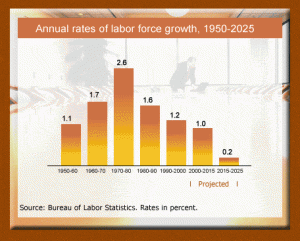The retirement of a generation of entrepreneurs (see www.theboomerbust.com) is an event unique in our history, or in anyone’s history for that matter. What we are about to experience is inevitable, and those who are unprepared are in for a rough time.
Let’s face facts. We Boomers complain about the lack of work ethic among our GenX and Millennial employees, but we are wrong. The problem isn’t them, it’s us. We were raised in a competitive environment, where there were too many bodies chasing too few opportunities. As a result, we became the most competitive generation in history, pushing the average work week, two-income families and new business formations to levels never seen before…or since.
We are responsible for the term “work-life balance.” It wasn’t a problem for our parents or grandparents, they didn’t have work impinging on their personal life. Our kids and grandkids are simply returning to an older ethos. Work has a purpose, but it isn’t the purpose of their lives.
Boomers went into small business in record numbers, partly because it freed them from the confines of a salary. All they needed to do in order to earn more was to work more. The more time you could devote to working, the more money you could make. Enter the drive-through restaurant, cup holders in cars, and ubiquitous telephones.
We could also save time by subcontracting routine chores to others. Ambitious Boomers offloaded mowing the lawn, fixing the front steps, and changing the oil in the car to someone else. That someone was usually another Boomer, who was working 70 hours a week in his oil change franchise so that he could outsource his lawn mowing and kids’ tutoring to yet another Boomer small business owner..
What developed was the most powerful economic engine of all time. Millions of people were freed from the strictures of a structured workday in their quest to be more productive. (How many times have you as a business owner, said that you are doing the work of two people?) The United States, and the rest of the world, enjoyed the greatest sustained expansion of all time. From 1975 (when the first Boomers turned 30) until 2005 (when they began reaching 60) productivity climbed, and the fortunes of everyone climbed with it.
Technology has certainly played a role in improved productivity (if you don’t count Facebook’s negative effect) but the driving force of the longest economic expansion was a bunch of slightly crazed Boomers working their tails off so that they could consume more. Work more, consume more, buy more services from other workaholics so they could consume more. It was a flawless recipe for prosperity.
 In 2014 the youngest Boomers will be 49, well into the age range when they begin to scale back spending for retirement savings. The oldest are 69, and leaving the workplace. The generation that is replacing them has half their numbers, and the one behind that is waiting, and waiting, and waiting for the Boomers to get out of the way.
In 2014 the youngest Boomers will be 49, well into the age range when they begin to scale back spending for retirement savings. The oldest are 69, and leaving the workplace. The generation that is replacing them has half their numbers, and the one behind that is waiting, and waiting, and waiting for the Boomers to get out of the way.
The four European countries with the lowest birthrates over the last 30 years are Spain, Portugal, Italy and Greece. Their generation that is supposed to be assuming the mantle of productive drivers is insufficient to accelerate their economies. You can’t grow an economy when you have a chronic shortage of workers and consumers.
In America, GenX is too small, and the Millennials (Gen Y) while as big a generation as the Boomers, are just beginning to enter their productive and consumption years. They are being stalled by lingering Boomers, educational debt (over a third of those who are working age are still living with parents) and a sluggish GDP.
Politicians, stockbrokers and real estate agents are telling us that the dip of 2008-2012 is over, and we are regaining momentum. No business owner whom I work with really believes it. Growth is slow and uneven, and there is little optimism. There is a good reason, and it’s inescapable. The only number that counts towards general prosperity is the increase or decrease in the number of productive workers as a percentage of total population, and that will continue to shrink for the next decade.
“Americans have to understand that the country’s demographic peak was ten yours ago.” Davit T. Beers, Head of Sovereign Debt Rating for S&P, on the downgrading of the US credit rating, August, 2011.
My new book, Hunting in a Farmer’s World: Celebrating the Mind of an  Entrepreneur, is now available on Amazon in paperback, hardcover and Kindle. It is an ownership book, not a management book, and is illustrated with the stories of real entrepreneurs who faced challenges that apply to us all.
Entrepreneur, is now available on Amazon in paperback, hardcover and Kindle. It is an ownership book, not a management book, and is illustrated with the stories of real entrepreneurs who faced challenges that apply to us all.

3 Responses to The Only Number that Counts